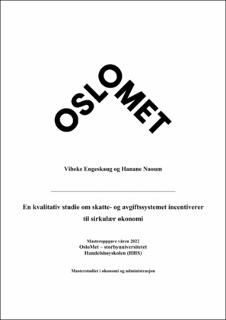| dc.description.abstract | In today ́s world, it is crucial to take the environmental perspective into account to maintain
long- term and profitable growth. In 2021, the European Council of Economic and Financial
Affairs (ECOFIN) prepared a strategy to give member states more flexibility to change
current tax rates regarding health, environment, and digitalization. This thesis studies if the
current Norwegian tax system incentivizes a circular economy. We conduct a qualitative
survey using semistructured interviews with fourteen informants with the purpose to highlight
the possibilities and disadvantages a change in current tax regulations within tax on obsolete
goods and VAT on reuse, repairs, and rental of clothing and shoes, hiking and sports
equipment, furniture, tools, and electronics.
Our findings may indicate that the current tax system does not incentivize a circular
economy. A modification to the law will first and foremost contribute to better utilization of
resources and promote circular business models. In addition, the change may change the
attitude within the industry, government, and the population. | en_US |
